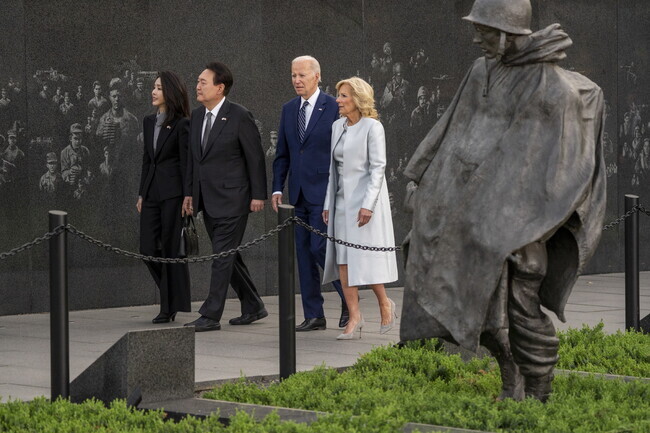hankyoreh
Links to other country sites 다른 나라 사이트 링크
[Editorial] S. Korea mustn’t let nuclear consultations with US curtail diplomatic leeway

After their summit on Wednesday, South Korean President Yoon Suk-yeol and US President Joe Biden announced the Washington Declaration, in which the two leaders agreed to establish a new Nuclear Consultative Group (NCG) to strengthen extended deterrence against North Korean threats.
The declaration specifically outlines the US commitment to deter the North Korean nuclear threat, the credibility of which will be increased by setting up the NCG for nuclear and strategic planning between the two allies. The measure is inevitable given the changed security environment. However, doubts remain about the effectiveness of this plan.
Prior to the summit, a senior US government official elaborated on the NCG, the establishment of which was officially announced in the Washington Declaration.
The idea behind the NCG is that, besides serving as a concrete structure for extended deterrence, it would guarantee South Korea’s say in the planning and implementation process of nuclear weapons operations and related joint plans. Joint US-South Korea training activities for nuclear deterrence were also mentioned.
The background of this declaration is the ever-growing North Korean nuclear threat. With fears growing that the US will not protect South Korea from North Korean nuclear threats at its own expense, calls for a domestic nuclear weapons program and for the redeployment of US strategic nuclear weapons to the southern half of the peninsula have been on the rise.
Besides easing South Korean security concerns, the establishment of the NCG gives South Korea an official say in US nuclear operations concerning the Korean Peninsula. As such, the plan to establish an NCG can be said to be the main outcome of this state visit.
Nevertheless, the decision to use nuclear force still rests with the US.
The NCG mentioned in the declaration seems to be modeled after the NATO Nuclear Planning Group). However, since US tactical nuclear weapons are already deployed in various NATO territories, the group has a relatively stronger joint operational character, including on nuclear weapons safety, security and control. On the other hand, it remains unclear to what extent South Korea’s position will be reflected in the new NCG.
In order to resolve the North Korean nuclear issue, the South Korean government must continue to increase efforts to strengthen the efficacy of extended deterrence.
It is also clear that the US agreeing to the establishment of this NCG should not be seen as a unilateral concession to South Korea.
For instance, the declaration includes a statement reaffirming South Korea’s “longstanding commitment to its obligations under the Nuclear Nonproliferation Treaty as the cornerstone of the global nonproliferation regime.” In other words, it puts a cap on calls for independent nuclear armament in South Korea or redeployment of US tactical nukes to the peninsula, allowing the US to uphold the nonproliferation regime.
As such, in return for the US agreeing to the NCG, the South Korean government should not take actions that undermine national interests such as blindly agreeing to US demands such as providing lethal aid to Ukraine, changing its stance on the Taiwan issue, or participating in the US technology blockade against China.
Above all, to resolve the North Korean nuclear issue, it is necessary to simultaneously strengthen efforts to increase the efficacy of extended deterrence and to create a breakthrough with dialogue and diplomacy.
In addition, it’s important to nip in the bud the possibility that this recent development could serve as a steppingstone toward a military alliance between South Korea, the US and Japan.
If South Korea is unilaterally sucked into the new US-led Cold War system, it must face up to the reality that relations with China and Russia, both of which have a strong influence on North Korea, will become more dangerous and the risk of a North Korean nuclear crisis and even war on or around the peninsula will increase.
Please direct questions or comments to [english@hani.co.kr]

Editorial・opinion
![[Editorial] Does Yoon think the Korean public is wrong? [Editorial] Does Yoon think the Korean public is wrong?](https://flexible.img.hani.co.kr/flexible/normal/500/300/imgdb/original/2024/0417/8517133419684774.jpg) [Editorial] Does Yoon think the Korean public is wrong?
[Editorial] Does Yoon think the Korean public is wrong?![[Editorial] As it bolsters its alliance with US, Japan must be accountable for past [Editorial] As it bolsters its alliance with US, Japan must be accountable for past](https://flexible.img.hani.co.kr/flexible/normal/500/300/imgdb/original/2024/0417/6817133413968321.jpg) [Editorial] As it bolsters its alliance with US, Japan must be accountable for past
[Editorial] As it bolsters its alliance with US, Japan must be accountable for past- [Guest essay] Amending the Constitution is Yoon’s key to leaving office in public’s good graces
- [Editorial] 10 years on, lessons of Sewol tragedy must never be forgotten
- [Column] A death blow to Korea’s prosecutor politics
- [Correspondent’s column] The US and the end of Japanese pacifism
- [Guest essay] How Korea turned its trainee doctors into monsters
- [Guest essay] As someone who helped forge Seoul-Moscow ties, their status today troubles me
- [Editorial] Koreans sent a loud and clear message to Yoon
- [Column] In Korea’s midterm elections, it’s time for accountability
Most viewed articles
- 1[Column] The clock is ticking for Korea’s first lady
- 2Samsung barricades office as unionized workers strike for better conditions
- 3[Editorial] When the choice is kids or career, Korea will never overcome birth rate woes
- 4[News analysis] After elections, prosecutorial reform will likely make legislative agenda
- 5Why Israel isn’t hitting Iran with immediate retaliation
- 6S. Korea, Japan reaffirm commitment to strengthening trilateral ties with US
- 7[Editorial] Does Yoon think the Korean public is wrong?
- 8[Guest essay] How Korea turned its trainee doctors into monsters
- 9[Editorial] 10 years on, lessons of Sewol tragedy must never be forgotten
- 10Strong dollar isn’t all that’s pushing won exchange rate into to 1,400 range